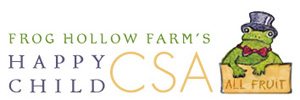THIS WEEK’S FRUIT
Tarocco Blood Oranges
Frog Hollow Farm, Brentwood, CA
A beautiful orange to deep red flesh is revealed when you slice open a Tarocco. The flesh of the blood orange is firmer and more dense than an orange and its flavor is a little more tart. These beauties sweeten and darken in color as the season progresses.
Algerian Tangerines
Abounding Harvest Mountain Farm, Los Gatos, CA
This tangerine’s skin is a beautiful red-orange hue and is so thin that it peels very easily. Inside the fruit is succulent and very sweet.
Hayward Kiwi
Chieci Farm, Live Oak, CA
Originally known as the Chinese gooseberry due to its Chinese origins. Hawyward Wright, a New Zealand nurseryman propagated his plants by grafting, and they eventually became the preferred cultivar of growers due to their sweet flavor and thin skin.
Fuji Apples
Cuyama Farm, New Cuyama, CA
Fujis are a cross between Red Delicious and Ralls Janet, an heirloom apple dating back to Thomas Jefferson. Fujis are loved by many for their crisp, sweet, and juicy character.
Navel Oranges
Twin Girls Farm, Yettem, CA
California Navel Oranges are considered to be the best Navels for eating out of hand. They have a thick skin that is easy to peel, are seedless and have a meaty and sweet flesh that makes them a perfect snack.
A NOTE FROM FARMER WILL
Dear CSA Members,
If you ask a seedsman about a particular plant variety, there could be a long tale of that seed traveling from this part of the world to another or being passed down from one generation to the next, its story spanning years or maybe even centuries. However, a seed’s past may also be quite mysterious.
There may only be a short, vague history with its origins before a certain point being lost to time forever. It may have been grown on an old family farm for years or gifted to a seedsman from an old friend or neighbor.
As a certified organic farm, all of the seed we source for our vegetable garden must be certified organic. Frog Hollow Farm is certified organic by CCOF, or California Certified Organic Farmers, a non-profit organization who is accredited by the United States Department of Agriculture’s (USDA) National Organic Program (NOP). The USDA sets standards for what is considered organic through the NOP and CCOF is one of many organizations that enforces those regulations and helps producers like Frog Hollow Farm follow the sometimes-complex guidelines.
Before Frog Hollow, I didn’t have any experience working with CCOF. It has been interesting, but also challenging, learning about the different regulations and the way CCOF requires documentation to be done. If a farmer wants to apply a new organic fertilizer, they have to petition CCOF and it must first be approved. Every time a farmer wants to spray a compost tea to bolster soil health, every ingredient in that compost tea has to be documented and approved. And if a farm wants to produce and use their own compost for that tea, they have to document what went into that compost and where it came from, document the temperature of the compost throughout the decomposition process, and send the compost to a lab for testing.
Because of the expense and the amount of paperwork required, some farmers who grow food without the use of synthetic chemicals and pesticides actually choose to not get certified. To say the least, it can be a complicated and drawn out process to understand and comply with certification. Even the task of selecting crop varieties and searching for organic seed can take a great deal of effort for a diversified vegetable operation. Just because a variety is an open-pollinated, GMO-free, heirloom variety doesn’t mean it is certified organic. Trying to find beautiful heirloom varieties that are certified organic is a challenge.
Organic food should be the norm. But because understanding the process can be so tricky, certified organic or not, it is important to know what you’re eating, the people who grow your food and how it is grown.

 Follow
Follow
